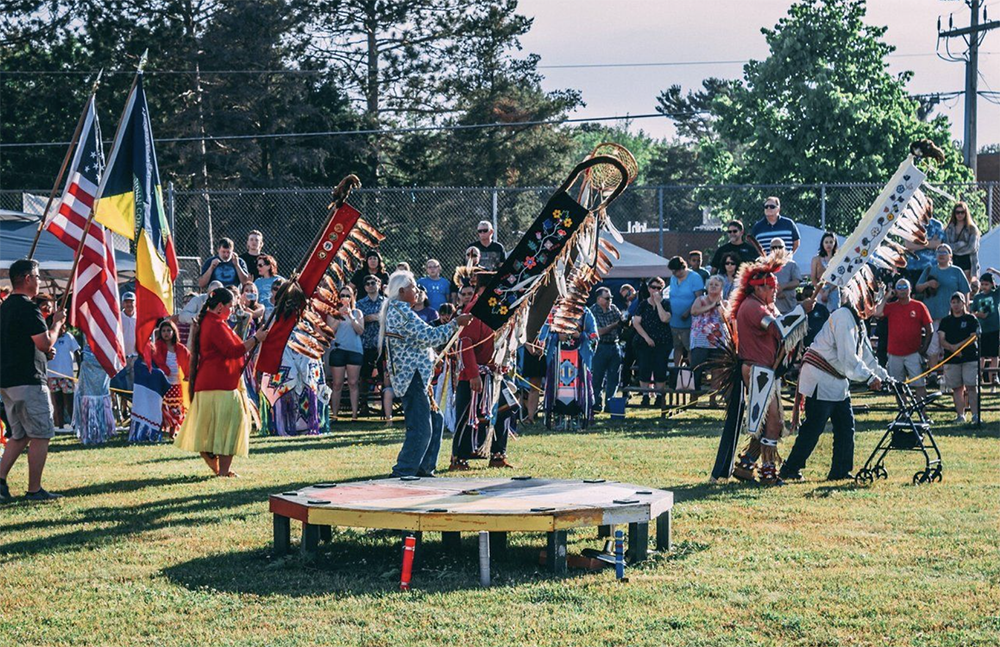
- Details
- By Michigan Economic Development Corporation
- Sponsored Content
Located in Chippewa County in Michigan’s Upper Peninsula, the Brimley Bay Mills Farmer’s Market features space for up to 70 vendors selling fresh produce, meats, Native American artwork, and more. Operated by the Bay Mills Indian Community and located in a tribal pavilion adorned with a harvest-themed mural, the farmer’s market provides a convenient spot for locals to get their essential food.
Before the pavilion was constructed, the market operated out of tents in the Bay Mills Casino parking lot. After support from the Michigan Economic Development Corporation (MEDC), the Brimley Bay Mills Farmer’s Market has a more permanent home.
“The MEDC helped develop a new farmer’s market with places for up to 70 vendors, electric and water hookups, bathrooms, parking, and a covered facility,” details Tom Durkee, director of tribal business development for the MEDC. “That’s transformational.”
The Start of the Tribal Business Development Strategy
The MEDC’s support of the Brimley Bay Mills Farmer’s Market is just one example of how the partnership between the MEDC and the 12 federally recognized Indian Tribes of Michigan has accelerated economic development for tribally owned businesses.
In 2010, the MEDC began an organized initiative known as the Tribal Business Development Strategy to strengthen its relationship with the Tribes of Michigan. Since the start, Durkee has been at the forefront, playing a key role in facilitating the growth of tribally owned businesses. Fourteen years later, the initiative has been a success.
One of the areas in which the MEDC has focused its efforts is helping tribally owned businesses develop strategic plans.
“There’s only so much funding out there,” says Durkee. “So, it’s a matter of prioritizing what the tribes want to do. One of the things we’ve pushed, and most tribes have taken advantage of, is developing a strategic plan, which the MEDC funds. It gives a guideline for the best things to move the tribe ahead and advance the initiatives they have.”
The MEDC works with each tribe to develop a plan that aligns with their priorities and goals, considers the unique skills, demographics, and challenges of the community, and provides actionable steps to achieve short- and long-term objectives.
The MEDC’s resources go beyond just planning. One of the key initiatives in the Tribal Business Development Strategy is the $1.3 million in annual funding available to tribally owned businesses. These funds help businesses start or expand in key industry sectors such as mobility and defense, including financing the construction of new facilities and purchasing machinery.
Measuring the Impact of Tribally Owned Businesses
To measure the success of the MEDC’s Tribal Business Development Strategy, the MEDC examines the resulting economic factors such as job creation, wage rates, the private investments tribes make alongside the MEDC, and exhausting the $1.3 million of funding every year. So far, the efforts have proven successful.
In 2019, the MEDC issued a grant to partially fund the Michigan Non-Gaming Tribal Economic Impact Study to quantify and provide empirical data to discuss the benefits of tribal business entities in Michigan. Led by the Waséyabek Development Company, the study found the 38 non-gaming business entities that participated generated a statewide economic impact of over $288 million and created 1,847 jobs with an average wage of $45,664. Five years later, plans are underway for another study.
“We’ve issued the grant to fund that study and make an update,” says Durkee. “It’s a valuable tool for the tribes to take a step back and say, here’s the impact we have, and of course, with this update, here’s how things have gotten even better.”
The MEDC and Tribally Owned Businesses Going Forward
Much like the Brimley Bay Mills Farmer’s Market, the MEDC and its relationship with tribally owned businesses started small but has blossomed over time. Durkee and the MEDC team don’t see the partnerships slowing down anytime soon.
“Going back to when we started, there were only a couple of tribally owned companies in 2011, and now there are dozens. We want to encourage and support that effort so the tribes continue to grow their businesses in the state of Michigan. That’s what we’re all about at the MEDC — ensuring communities grow and build their economies.”